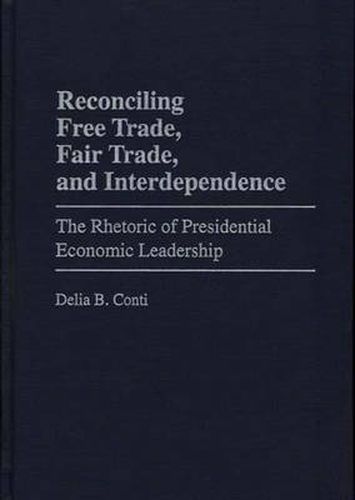Readings Newsletter
Become a Readings Member to make your shopping experience even easier.
Sign in or sign up for free!
You’re not far away from qualifying for FREE standard shipping within Australia
You’ve qualified for FREE standard shipping within Australia
The cart is loading…






Conti examines presidential rhetoric on trade, providing a detailed analysis of presidential trade arguments and strategies throughout American history. She then concentrates on the rhetoric of contemporary presidents, who have had to contend with both the burgeoning trade deficit and the displacement of military competitiveness with post-cold war economic competitiveness. Despite vast disparities in governing philosophies and strategies, Presidents Reagan, Bush, and Clinton all preached the virtues of free trade while continuing a policy of select protectionist actions.
As Conti suggests, the arcane details of trade policy, the continuing pervasiveness of nontariff barriers, and the impending negotiation of international trade agreements combine to make presidential leadership on economic issues critical. How effective that leadership can be is, in large part, dependent upon the effectiveness of presidential rhetoric. Students, scholars, and researchers in the field of speech communication and rhetoric, political communication, public affairs, and the presidency will find this a stimulating survey.
$9.00 standard shipping within Australia
FREE standard shipping within Australia for orders over $100.00
Express & International shipping calculated at checkout
Conti examines presidential rhetoric on trade, providing a detailed analysis of presidential trade arguments and strategies throughout American history. She then concentrates on the rhetoric of contemporary presidents, who have had to contend with both the burgeoning trade deficit and the displacement of military competitiveness with post-cold war economic competitiveness. Despite vast disparities in governing philosophies and strategies, Presidents Reagan, Bush, and Clinton all preached the virtues of free trade while continuing a policy of select protectionist actions.
As Conti suggests, the arcane details of trade policy, the continuing pervasiveness of nontariff barriers, and the impending negotiation of international trade agreements combine to make presidential leadership on economic issues critical. How effective that leadership can be is, in large part, dependent upon the effectiveness of presidential rhetoric. Students, scholars, and researchers in the field of speech communication and rhetoric, political communication, public affairs, and the presidency will find this a stimulating survey.